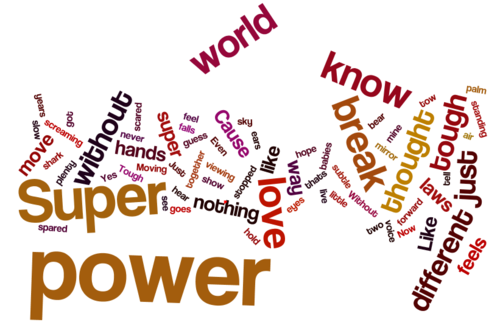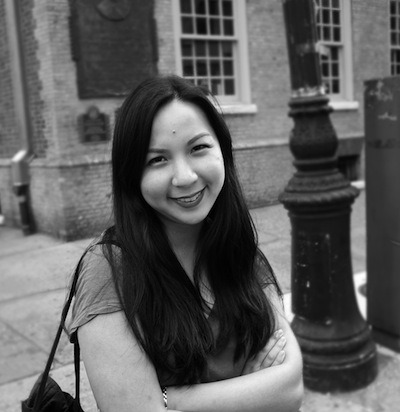For each day of National Poetry Month one of our fellows will explore the breadth of poetry in three ways: through a question from another fellow, through a poem and through a writing prompt, #writetoday.

[QUESTION]
Margaret Rhee asks, Recall a time when you felt a poem viscerally in your body. What was meaningful about the memory? About the poem?
Cynthia Arrieu-King responds, When I read most poems, I feel something viscerally in my body. That makes this question difficult. I have had the strange sensation while reading Stein that I am smiling on the inside though my face is not smiling. I have had the feeling while reading Neruda that I am a child who cannot stand being inside anymore and needs to go run through the streets. The poem “Walking Around” by Neruda made me run around in the basement for a while, jogging just like the speaker who “runs through the streets at night with a sexy knife, shouting until he froze to death”. I recall about the poem the swans made of felt, the sad Atget-dark type dentist offices. I remember the cold floor under my feet and feeling propelled forward towards knowing something. The thing in my mind that belongs to books, to imagined places and moments lodges in me as a beautiful ephemeral unfolding that’s always available, and somehow still, made of brain and blood, the imagined cold on my face.
[POEM]
Before the Party
How often one is not asked what one is, where one is from.
I study waterlines in the river,
count off the boats as each passes with strangers.
Melody out of its context,
some unanswerable figment or fragment that hangs
over the soon-on lights.
The way afternoon lays them all out together,
a vased forsythia ready for more water.
To dream of being elsewhere and here at the same time.
To know that the party is difficult at first for everyone.
~
Out the window, they were throwing plantable hair, bundled grass-like hair.
Grass sparkled grass blue down to the East River,
Hasidem in Burberry high-necked blouses
chased their kids and their kids’ yarmulkes and curls.
I was trying to solve the problem of where to begin
here where each cable of the bridge needs replacing
where the necessary trains run rarely, these
arms the gesture of futility where the woman
and man walk the street in a bridal gown and tux.
Getting married, taffeta strong, concrete as hard.
The sign covered with white. No one down
with a supposition that time could bend back to itself
in the river where we’d been before.
I see you announcing nuptials and hurrying at the window
to let in everything, doors open for normal life.
~
From here the Manhattan Bridge throws itself across.
White wire frantic in tension, the arcs laddered.
Remember Brett, drunk, climbed the pilings, called
seven states at two a.m. from the cold metal
between his legs, wind lashing his hair?
A total vertigo and that’s enough. Grand piano
overlooking the East River, some gunwales,
Whitman’s firehouse. Jared plays the piano.
The gasoline-fire-sunset extinguished hours ago, hours—
~
Maybe a chord throws you into the sky. The next tethers you back again.
My friend’s insistence on never being on time to parties,
but playing one last stormy song on the piano.
I imagine the composer thirty years before capturing
a kind of spontaneous aesthetic curl. A nap coming.
The maker made, the new man plays it.
Zero sense that a pianist loves the climb of notes: they appear into air.
They’re late for the party. People as notes.
Long walk to the closet.
Long walk to an arrangement of clean water glasses.
Long walk to wash hands.
My friend has brought a coral sheet to throw over this afternoon.
~
The recalled cartoon: a man on a cell phone says,
“I am on the train, I am getting off the train, I am off the train.”
I am on the platform, I am getting on the train, I am on the train
and befriending the old skinny couple taking
the same re-routing I had to take.
How about this air-conditioning? the old man asked. I remember
when the train would run from 6th street with the doors
open and one fan blowing at the end?
He and his wife look like senior citizens robbed of their clothes
and given the street-wear of hipsters, keeping up.
~
I recall reading at dawn102 comments on an article about regret:
The man who left his father’s deathbed to finish a report at Morgan Stanley;
how he wishes he had just walked out of the office that day.
The woman who stayed with her terrible boyfriend
who then left her childless forever.
Something like reading through essays about mothers who
slap and handle their grown daughters.
My student who writes about a friend making her promise
never to tell and showing her
a garbage bag that stinks and saying I had a baby
and I look up from the essay
and don’t know who to tell or whether to at all.
~
I think of thinking-on-the-subway.
Farrah throws the butt of a scarf over her shoulder before me.
I decide to make schemata on being in two places at once.
Liminal space of telephone talk,
walking the beach, standing in the doorway.
Lintel and handset.
Is where the land and the sea meet really
literature, like Bishop said?
Is half of one thing and half its opposite tossed together
really a story?
All the photos trying to tell a story
rather than simply showing things as they are.
~
I think of Chopin, I think of Satie.
My friend’s hands press out notes.
Home mists to omission.
The almost-pain of saying goodbye quickly,
the other person’s eyes already elsewhere.
Not counting on the sound of
reeds ticking together, the white gulls
planted in the green. Right now, in the city.
They say browns and blacks against mostly white
trick you into thinking
you are looking at a dream.
Thinking of the great paintings of snow: what symbol
underneath?
A symbol of white over symbols of everything.
A gray nation floundering down until it gets a spray
of bright orange at its throat.
~
When you first arrive and stand
by the forty-spice party hummus, you dream
of an alleyway where no one can notice you.
This wisdom of taking forever to get out the door.
Opening and shutting of drawers.
A word is a drawer.
Scarf. Subway. Recollection. Leaving. Melody.
A limit, a border placed on the river edge, on the park boundary.
The edge of diesel-cigar-coffee-pigeon orchestrated scent.
This game of guessing which composer wrote this.
Reading sheet music floating on the past,
from memory placing the notes, silver and lilting.
~
I doze. I don’t know what happened in that dream except
my brother gave me advice while he was
a panda drowning in light. An almost Buddha.
The field stood still and rippled its reeds.
~
Thing itself a blueprint
River never the same river twice, they say:
I ask Jared with his fingers tinkling out on keys
who wrote that— this friend who knows every writer, every painter.
Out in Manhattan, the clouds shade something unseen from here.
He says I was making it up as I went along.

Cynthia Arrieu-King is professor of creative writing at the Richard Stockton College of New Jersey.


























